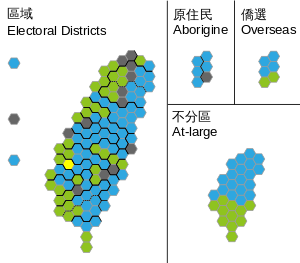
The Democratic Progressive Party (DPP) is a Taiwanese nationalist and centre-left political party in Taiwan. Controlling both the Taiwan Presidency and the unicameral Legislative Yuan, it is the majority ruling party and the dominant party in the Pan-Green Coalition.

Green Party Taiwan is a political party in Taiwan established on 25 January 1996. Although the party is sympathetic to Taiwan nationalism and shares a number of centre-left positions with the Pan-Green Coalition, the party emphasizes campaigning primarily on social and environmental issues. The party is not a member of, and should not be confused with, the Pan-Green Coalition. Green Party Taiwan is a member of the Asia Pacific Greens Federation and participates in the Global Greens.

The Legislative Yuan is the unicameral legislature of the Republic of China now based in Taiwan. It is one of the five branches of government stipulated by the Constitution of the Republic of China, which follows Sun Yat-sen's Three Principles of the People.
The election of the Legislative Yuan of Taiwan is a direct election by the citizens of Taiwan. The Legislative Yuan is the unicameral legislature of the country. Currently there are 113 seats in the Legislative Yuan and all seats are open for elections. Of those seats, 73 are directly elected in local single-member districts, 6 are directly elected by Taiwanese aborigines and the remaining 34 are elected by party-list proportional representation. The most recent election took place on January 16, 2016 together with the presidential election.

The Election for the 6th Legislative Yuan (第六屆立法委員選舉) of Taiwan was held on December 11, 2004. All 225 seats of the Legislative Yuan were up for election: 168 elected by popular vote, 41 elected on the basis of the proportion of nationwide votes received by participating political parties, eight elected from overseas Chinese constituencies on the basis of the proportion of nationwide votes received by participating political parties, eight elected by popular vote among the aboriginal populations. Members served three-year terms beginning on February 1, 2005, and ending January 31, 2008. The next term served four years.

Elections in Taiwan are held on national and local level. On the national level, the head of state, the President, and members of the national legislature, the Legislative Yuan, are elected directly by citizens of Taiwan. National elections are held every four years.

The People's Republic of China (PRC) claims the island of Taiwan to be part its territory under its Constitution as the Taiwan Province. In combination with the Republic of China-controlled Fujian islands, it is usually referred to by mainland media as the Taiwan Region or Taiwan Area.

The Election for the 4th Legislative Yuan were held in Taiwan on 5 December 1998. The result was a victory for the Kuomintang, which won 123 of the 225 seats. Voter turnout was 68.1%.
The first supplementary elections took place for the National Assembly and the Legislative Yuan in the Republic of China on 20 December 1969. Voter turnout was 54.7% and 55.0% respectively.
The second supplementary elections took place for the National Assembly and Legislative Yuan of the Republic of China (Taiwan) on 23 December 1972.
The third supplementary elections for the Legislative Yuan were held in the Republic of China (Taiwan) on 20 December 1975.
The fourth supplementary elections for the National Assembly and Legislative Yuan were held in the Republic of China (Taiwan) on 6 December 1980.
The fifth supplementary elections for the Legislative Yuan were held in the Republic of China (Taiwan) on 3 December 1983.
The sixth supplementary elections for the National Assembly and Legislative Yuan were held in the Republic of China (Taiwan) on 6 December 1986.
The seventh and final supplementary elections for the Legislative Yuan were held in the Republic of China (Taiwan) on 3 December 1989.
General elections were held in Taiwan, officially the Republic of China, on Saturday, 16 January 2016 to elect the 14th President and Vice President of the Republic of China, and all 113 members of the ninth Legislative Yuan:

The New Power Party is a political party in Taiwan formed in early 2015. The party emerged from the Sunflower Student Movement in 2014, and advocates for universal human rights, civil and political liberties, as well as Taiwan independence/nationalism. The party is a part of the political phenomenon known as the "Third Force" (第三勢力), in which new political parties, unaligned with traditional Pan-Green or Pan-Blue Coalitions, sought to provide an alternative in Taiwanese politics. Nevertheless, the NPP's policies are very much aligned and closely matches the Pan-Green camp; thus the NPP cooperated with the DPP against the KMT in the 2016 elections, going as far as to run in traditional KMT strongholds to avoid competition with the DPP. The party works in tandem with a perceived generational shift towards Taiwan-centrism as the new socio-cultural norm.

Local elections were held on 24 November 2018 in Taiwan, to elect county magistrates, county (city) councilors, township mayors, township councilors and chiefs of village (borough) in 6 municipalities and 16 counties (cities). Elected officials would serve a four-year term. Polling stations were open from 08:00 to 16:00 on the election day.

Legislative elections in South Korea determine the composition of the National Assembly for the next four years.

The 15th President and Vice President election of the Republic of China is scheduled to be held in Taiwan on 11 January 2020. Voters will either elect a new President and Vice President or re-elect the incumbents. The process of presidential primary elections and nominations were held in late 2019.












